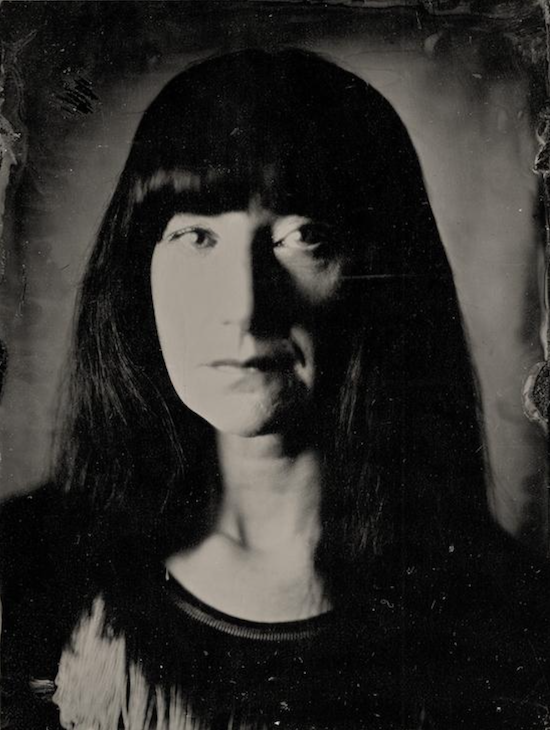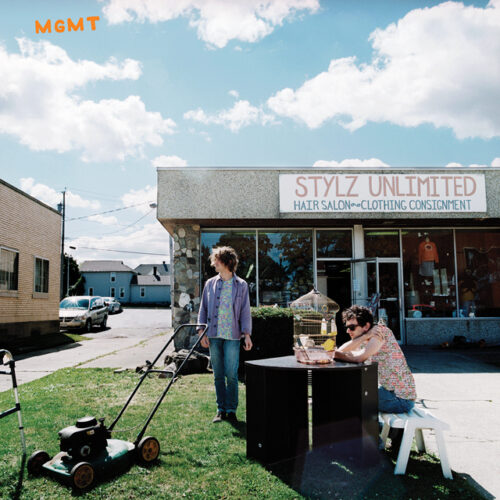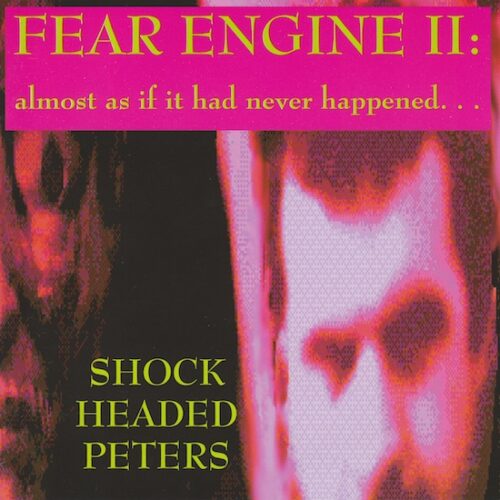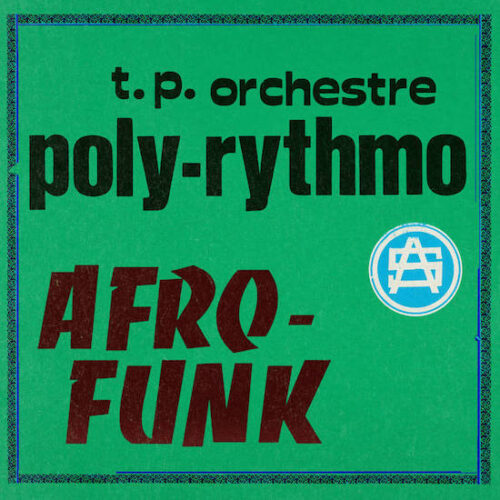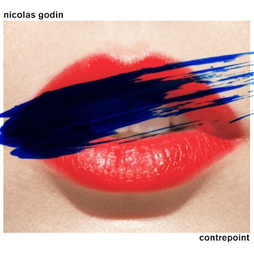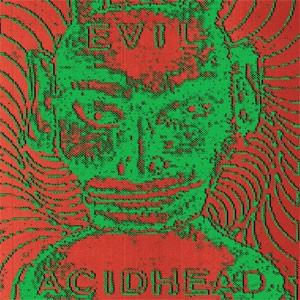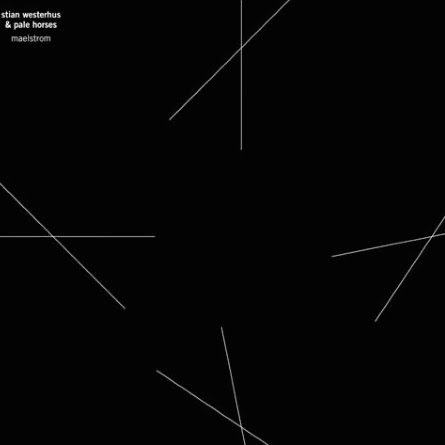Alison Cotton tintype portrait by Andy Martin
To receive Singularity track ‘What You Told Me On That Journey In The Horse & Carriage’ by Alison Cotton become a Quietus Sound & Vision subscriber
Alison Cotton, both through the duo The Left Outsides and in her own right, occupies a liminal space, a creative crossing point that feels very present and in the moment while suggesting pasts and alternate ways of interpreting the world surrounding us. For her contribution to the Singularity series, her nearly twenty-minute piece ‘What You Told Me On That Journey In The Horse & Carriage’ could in its title be something from a discovered manuscript, perhaps a lost George Eliot fragment. As Cotton relates in this interview and some further emails, the sense of the composition is much more than simply some words setting a mood.
"I find that if I start recording," Cotton says by way of initial explanation, "I usually don’t have any idea of what I’m going to be playing, and I just play. I don’t really know where it comes from to be honest. I don’t think about what key I’m playing. It just sort of takes me somewhere else and I just get a bit lost in another zone really." This sense of another zone can be heard throughout her work, as featured on two solo albums which will be reissued soon on Friendly Records – All Is Quiet At The Ancient Theatre and the justly celebrated followup Only Darkness Now – as well as her new forthcoming album The Portrait You Painted Of Me on Rocket Recordings; for all three albums, the US label is Feeding Tube. For her Singularity piece, this zone took on the form of a larger scenario which prompted the striking title.
"As what usually happens when I record, a scene, or a story comes into my head as I play," Cotton describes. "That evening, the scene was me travelling by horse & carriage probably in the 1800s. The drone depicts what is at first, a seemingly calm journey. I’m travelling with someone else and it’s a bleak, barren landscape, it’s very misty but the moon still shines through, lighting the road ahead."
Cotton breaks down the track further, noting the separate violin and viola elements as representing a conversation, where the other person is speaking something of a confession, all while other musical parts continue to represent the journey such as shakers representing horses getting stuck in the mud. But as the second half of the piece begins, things take a more unsettled turn. As Cotton notes, how to carry out this sense of change was core for the track: "I was thinking about changing key, but I just don’t really think that would have suited my music as much. I thought it would flow more for the listener if I just made it a lot more intense and changed in atmosphere rather than musically in a way, rather than in key."
Returning to the scenario she imagines for the song, she concludes the story as such: "The horses are disturbed by something, perhaps a highway person, who’s broken into the carriage, or perhaps the conversation and confession of my fellow traveller becoming more intense. The cymbals represent a commotion and a sense of fear and the carriage overturns," with the addition of unsettled screams and cries contributing to the closing of the piece.
It’s a vivid narrative for a lyric-free composition, one that deeply reflects Cotton’s abilities with her instruments, the viola paramount as ever, as well as her gift for elaborating what could easily ‘just’ be a drone track – albeit a remarkably beautiful one – to incorporate other facets to create something of an audio drama. But, as Cotton frankly notes, that shift in the song’s conclusion was also due to "partly me trying to create how my head felt in the weeks following our accident" – referring to the traumatic car crash suffered by her and her husband and Left Outsides bandmate Mark Nicholas earlier this year.
In conversation, Cotton is clear that she still is working through the effects of the accident in particular – she received a concussion, while Nicholas thankfully was far less directly impacted – and that things are still on a careful, step by step journey with her as she goes. "When it first happened," she recalls, "for a few days after I was just walking around in a daze. I think it was like looking back, it was the adrenaline after the accident. Then it was like I just fell back down to earth, it was just like this huge crash back to earth. Suddenly I just felt like, just so down, just realising actually what really had happened."
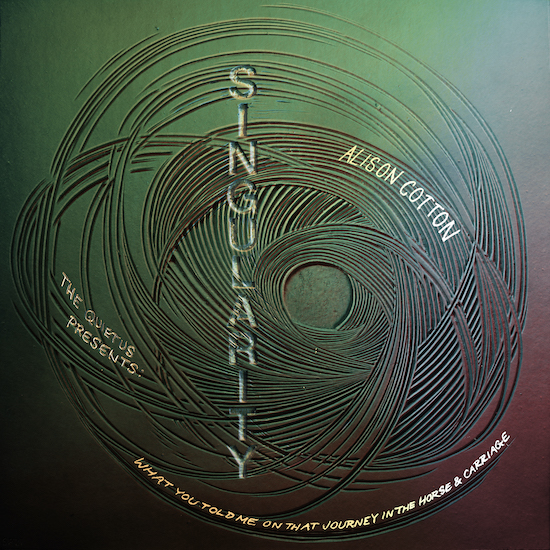
‘What You Told Me On That Journey In The Horse & Carriage’ art
She later elaborates on more of what that day involved, describing a favoured activity, out shopping with Nicholas at various vintage and charity shops. "Normally I’d be in my element, looking through the rails of clothes and at the records, trying clothes on, but instead I just wandered in a complete daze, not really taking anything in," she remembers. "When we got to about the eighth shop, Mark realised I hadn’t bought a thing which was really very unusual for me! I just grabbed the nearest thing I saw, a Monty Don’s Italian Gardens DVD and bought that for £1. Within a couple of hours of this, it was like I crashed back down to earth."
While this sense of almost physical remembrance was heavy, Cotton also credits an unexpected move for her that helped her begin the path forward, above all the sense of reassurance that she did not have to feel isolated on this journey – an experience too often felt by many. After returning home from the shopping trip outside, says Cotton, "the first thing I did, which is something I never do, I’m usually quite a private person, really. I went onto Facebook; I just wanted to hear from other people who had experienced a similar thing, and just asking if anyone has any advice. I was just overwhelmed by how many people were messaging me, so I got some pretty good advice there, and then I’ve been getting some counselling, but I need to go onto another stage of counselling, because they think I’ve got PTSD now."
Cotton’s journey is one that continues to unfold; unsurprisingly, car trips were a source of great anxiety, though she is happy to say that things have greatly improved with time and focus, in contrast to remembering what things were like in the initial weeks in particular after the accident. "I was arriving at the destination either in tears or often vomiting on arrival when out in the fresh air, due to the stress of being in a car," she elaborates. "It was really frustrating that something once so normal had turned into this. I was still determined to keep on with it though as every time I did it I thought it would get easier, even if I sat with my eyes closed for the entire journey! It does make me realise how far I’ve come when I look back to things as extreme as this happening.
"I do keep seeing potential danger in things, which is not something I used to do at all. There is just shock as well. Tiny things will shock me. There’s one example; I was walking just down the road with my son, and he stood on one of those polystyrene takeaway boxes that kebabs come in, the sound of it, it was like a crunch, just like how the crash sounded. At the same time, there was a motorbike coming past really fast. And I just grabbed my son and just screamed."
In lieu of this resultant trauma and aftereffects it’s not surprising that ‘What You Told Me On That Journey In The Horse & Carriage’ has taken the form it has, with its further atmospheric elements transforming a somewhat more peaceful journey into something far less so. As Cotton notes further about its origins, the invitation to create a track for the Singularity series came at an unexpected moment in her initial recovery.
"I had a few bits just to finish off on my [new] album," she notes, "just a few overdubs. I was going through probably the worst part of everything since the accident. Getting asked to do this piece, it was just really what I needed, because I was just finishing off the album. It was great just to have something to concentrate on."
Cotton very much feels that this was a therapeutic process in general for her, not just simply for the creation of music in and of itself as an artist, but in how it was done, noting that the concluding screams certainly had their role. "That was quite good," she remembers. "I tried to mimic the screams how I screamed in the accident. Even doing that, it helped in a way, but we had to go to an industrial estate to record it, because we’re not recording that in the house. The neighbours will be wondering what’s going on!"
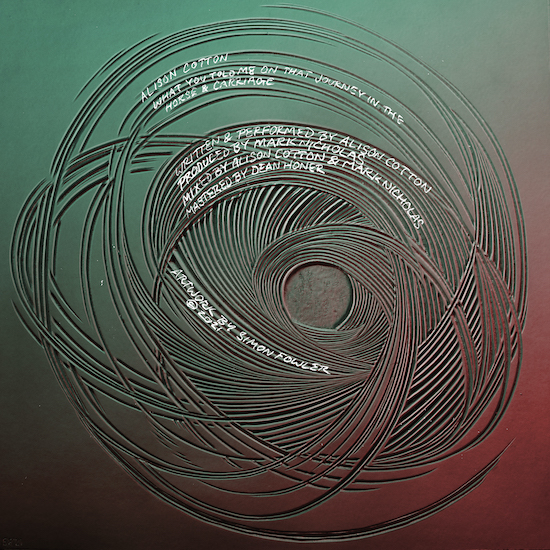
‘What You Told Me On That Journey In The Horse & Carriage’ credits
Cotton herself normally records at home, something which helps contribute in terms of both the atmospheres she creates as well as the one she enjoys being in, saying that it used to be the home of Buddhists who she feels has added to the fuller spirit of the house. "They used to have a lot of meetings here," she explains, "[and] I can really just still feel in the house. I’ve usually got candles lit when I’m playing, and sometimes I’m looking out I can see the moon." All of this adds to her creative flow of her work, and while not every song she creates fits within the realm of drone as such – the short, folky ‘In Solitude I Will Fade Away’ from Only Darkness Now is a good example of another approach – she finds the form extremely gratifying to work within.
"I like the fact that I’ve got a lot more space to work!" she happily states. "I like adding melodic motifs just to a plain drone track. When it comes back in, I just think it probably has more of an impact on the listener than if it was like a just traditional song base thing, where the chorus would come in and you almost know more where things are going to happen with a song."
The praise and attention Only Darkness Now has rightly received has meant its partner in being reissued, All Is Quiet At The Ancient Theatre, has been somewhat overshadowed by the later release, so one hopes that further attention will now be given to the equally remarkable release. More strictly instrumental than Only Darkness Now, its five compositions reflect Cotton’s strong gift for song titles, such as ’36 Dramatic Situations’ and ‘A Tragedy In The Tithe Barn’, as well as her ever mesmerising work on viola and further instruments. But as Cotton describes it, All Is Quiet wasn’t initially meant to be an album at all: "I got asked to do a track for a compilation, a Pauline Oliveros tribute. [That track] was called ‘The Last Sense To Leave Us,’ [and] that ended up appearing on my album. Then things started coming together: there was a friend of mine who runs Bloxham Tapes who actually put out the album, and he said, ‘I’d love to hear more music.’ I thought, "Well, I might as well record some more and turn it into an album." I didn’t really record any of the tracks with an album in mind, apart from the last two really."
Though as she notes its recording predates the accident, Cotton feels the forthcoming The Portrait You Painted Of Me will be "a little heavier or maybe, more intense in places" in comparison to previous work, reflecting instead both the aftereffects of COVID and travel lockdowns and reflections on the past in several senses. Noting she was unable to visit her family in the northeast, she adds, "I somehow found myself thinking a lot about the region’s industrial past as I recorded some of these new pieces. I think these thoughts and mood are reflected in the music although, in contrast, a good part of it is still inspired by the pastoral landscape. I’d say there’s more contrast in subject, texture and dynamic on this album."
Cotton has begun playing out again recently, something she describes as loving even more than recording for the feelings generated and the possibility of extra surprise, and she remains grateful and surprised herself at the reaction her work has already generated, singling out the praise she’s received from some of her music heroes from her youth such as Nick McCabe and Jonathan Donahue as particularly gratifying. Meanwhile, she will continue to work on her recovery as she goes as well, though she does wryly talk about one unexpected result of the accident in turn: "I’d been knocked on the head three times in three different places in the crash, as there were three different stages to it. Once, about 15 years ago, I fainted and I fell on my nose; I’ve always had a Roman nose with a bump in it. After fainting, it knocked the bump to one side, so it was a bit wonky. Miraculously now after the accident, it’s been knocked back into shape again!"
To receive ‘What You Told Me On That Journey In The Horse & Carriage’ by Alison Cotton, as well as a host of other benefits including exclusive essays, podcasts and playlists, and loads more specially-commissioned music, become a Quietus Sound & Vision subscriber. You can do so here

